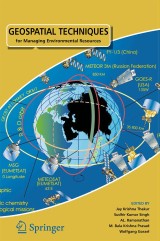Details

Geospatial Techniques for Managing Environmental Resources
|
96,29 € |
|
| Verlag: | Springer |
| Format: | |
| Veröffentl.: | 05.03.2012 |
| ISBN/EAN: | 9789400718586 |
| Sprache: | englisch |
| Anzahl Seiten: | 280 |
Dieses eBook enthält ein Wasserzeichen.
Beschreibungen
<p>"Geospatial Information" is spatial data concerning a place or, in space, collected in real time. Geospatial techniques together with remote sensing, geographic information science, Global Positioning System (GPS), cartography, geovisualization, and spatial statistics are being used to capture, store, manipulate and analyze to understand complex situations to solve mysteries of the universe. These techniques have been applied in various fields such as meteorology, forestry, environmental management, agriculture, health, homeland security etc. around the globe. This volume presents case studies and examples from various parts of the world and provides a broad overview of various approaches; data sets; data acquiring, monitoring and dissemination methods; satellites and sensors; tools and techniques used; integrating tools, techniques and application to various fields for the sustainable management of environmental resources in the context of global environmental change and natural hazards. The objective of this book is to provide state-of-the-art information to academics, researchers and industry practitioners who are involved or interested in the study, use, design and development of advanced and emerging geospatial technologies around the world with ultimate aim to empower individuals and organizations in building competencies for exploiting the opportunities of the knowledge society. All the chapters are peer-reviewes and evaluated and are an inter- and multi-disciplinary source of information, making an effort to link various geospatial techniques to make the earth an habitable place. The contributors have tried to focus their respective views on the current problems that need urgent attention. Consequently, we see this book as a comprehensive information base, which includes work of expertise in their specific fields of research.</p>
<p>Foreword.- Preface.- About the Editors.- 1. Environmental Informatics: Advancing Data Intensive Sciences to Solve Environmental Problems.- 2. Hierarchical Geospatial Computing Environment for Data-intensive Geographic Process Simulation.- 3. Integration of Geographic Information Systems for Monitoring and Dissemination of Marine Environment Data.- 4. Estimation of Evapotranspiration from Wetlands Using Geospatial and Hydrometeorological Data.- 5. Climbing the Water Ladder -- The New GIS Approach.- 6. Supraglacial Lake Classification in the Everest Region of Nepal Himalaya.- 7. Towards the Improvement of Water Resource Management by Combining Technologies for Spatial Data Collection, Storage, Analysis and Dissemination.- 8. Geomorphologic Risk Modelling of the Sibiu Depression Using Geospatial Surface Analyses.- 9. Geospatial Technique to Study Forest Cover Using ALOS/PALSAR Data.- 10. Assessment of Land Use/Land Cover Using Geospatial Techniques in a Semi-arid Region of Madhya Pradesh, India.- 11. The Environmental Calculator: ATool for the Efficient Assessment of Environmental Services Loss due to Deforestation.- 12. Urban Tree Detection Using Mobile Laser Scanning Data.- 13. Multisensor Fusion of Remote Sensing Data for Crop Disease Detection.- 14. Geospatial Analysis of Cancer Cases in the Eastern Black Sea Region of Turkey.- 15. GIS for the Determination of Bioenergy Potential in the Centre Region of Portugal.- 16. Use of Geospatial Data in Planning for Offshore Wind Development.- 17. Social Vulnerability Assessment through GIS Techniques: A Case Study of Flood Risk Mapping in Mexico.- Index</p>
<p>"Geospatial Information" is spatial data concerning a place or, in space, collected in real time. Geospatial techniques together with remote sensing, geographic information science, Global Positioning System (GPS), cartography, geovisualization, and spatial statistics are being used to capture, store, manipulate and analyze to understand complex situations to solve mysteries of the universe. These techniques have been applied in various fields such as meteorology, forestry, environmental management, agriculture, health, homeland security etc. around the globe. This volume presents the case studies and examples from various parts of the world and provides a broad overview of various approaches; data sets; data acquiring, monitoring and dissemination methods; satellites and sensors; tools and techniques used; integrating tools, techniques and application to various fields for the sustainable management of environmental resources in the context of global environmental change and natural hazards. The objective of this book is to provide state-of-the-art information to academics, researchers and industry practitioners who are involved or interested in the study, use, design and development of advanced and emerging geospatial technologies around the world with ultimate aim to empower individuals and organizations in building competencies for exploiting the opportunities of the knowledge society. The chapters form an inter- and multi-disciplinary source of information, making an effort to link various geospatial techniques to make the earth an habitable place. The contributors have tried to focus their respective views on the current problems that need urgent attention. Consequently, we see this book as a comprehensive information base, which includes work of expertise in their specific fields of research.</p>
Comprehensive introduction of geospatial techniques, data management in relation with remote sensing, GIS, GPS, geodatesets, geovisualization and geomatics Integrates research and developments to real-world application in the field of geospatial techniques, remote sensing, GIS, GPS, geodatesets, geovisualization and geomatics Presents recent advancement in the management of world resources special reference to environmental management, natural resources management, disaster management, land information system management, etc. Presents the latest state of the art in research and development results on this topic, updated software and hardware status, research and industrial challenges and opportunities Investigates how some advanced geospatial technologies can be applied to current academic and industrial research systems
Diese Produkte könnten Sie auch interessieren:

Observing Systems for Atmospheric Composition

von: Guido Visconti, Pietro Di Carlo, W. Brune, M. Schoeberl, Andreas Wahner

149,79 €















